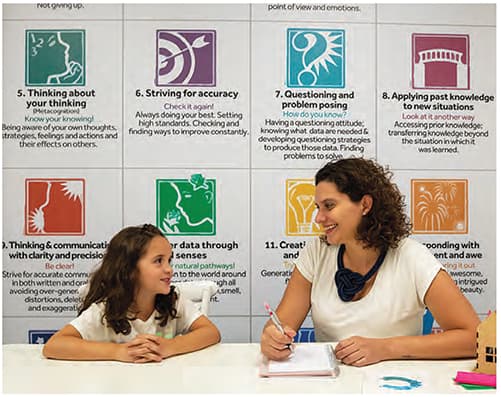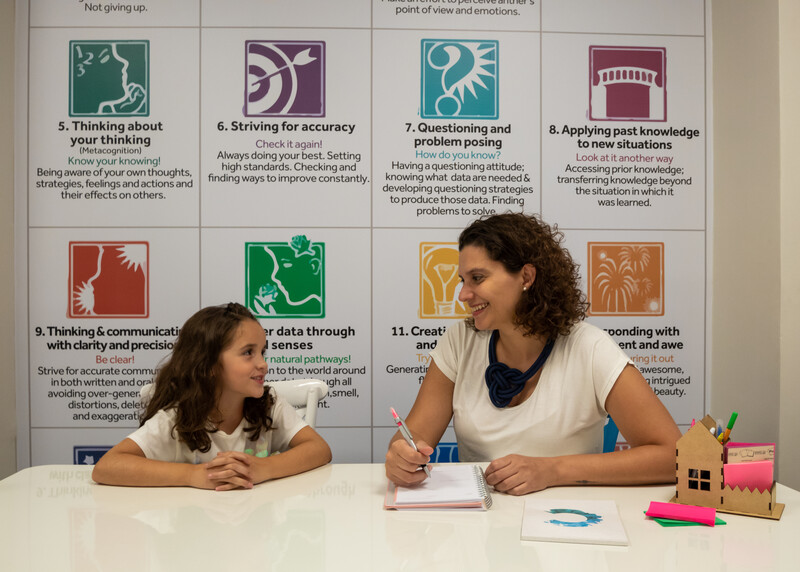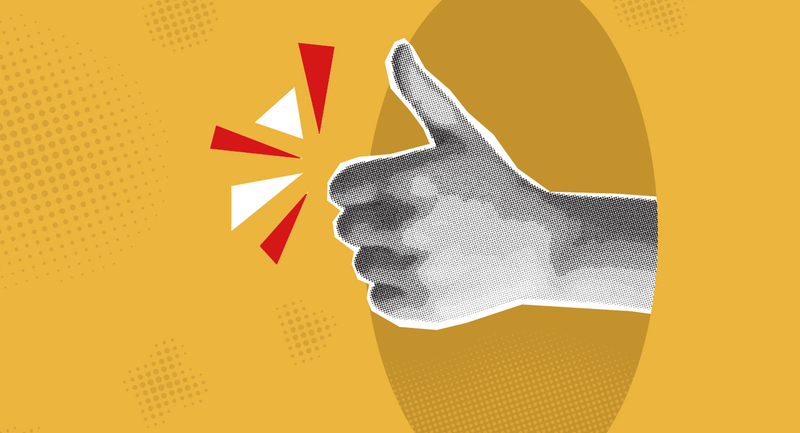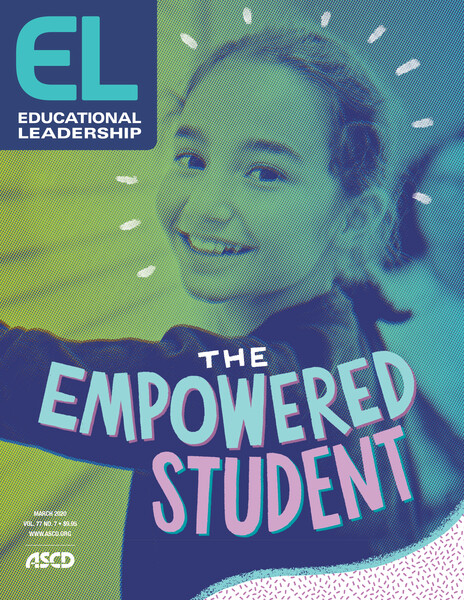
A 2nd grader at Escola Concept São Paulo in Brazil, an affiliate center for the Institute for the Habits of Mind, reflects on her decision making processes with a teacher at the school. Photo courtesy of Escola Concept São Paulo, Brazil.
Understandings and Essential Questions
Figure 1. Sample Understandings and Essential Questions for the Habits of Mind
Dispositions by Design-table
HABIT OF MIND | UNDERSTANDINGS | ESSENTIAL QUESTIONS |
|---|---|---|
| Persisting | "People have a better chance of completing a task if they are focused on what they want, what they have to do, the time they have to get it done, and a plan for how they will achieve it. Instead of giving up, people who persist apply strategies to help them stick with a task. People need to decide whether persisting is worth pursuing. They understand the benefits and recognize the value of persisting." | "Why should I keep trying? What should I do when I get stuck? Why is it so important that I work to complete this task? What are the consequences if I do or do not complete the task? Would my time and efforts be better applied elsewhere? Is this worth my persistence?" |
| Managing Impulsivity | "The ability to manage one's impulses can be improved through being deliberate about actions and reflecting on experiences over time. Instead of acting or responding immediately, effective thinkers control their emotions, deliberate, and consider the consequences of alternative actions. Efficacious thinkers understand the benefits and recognize the value of managing their impulsivity." | "Why and when should I take time to think before I act? What is my strategy for this challenge? What do I do when I am driven by my emotions? How might I recognize my emotional state and manage my response?" |
| Listening with Understanding and Empathy | The ability to listen to another person with understanding requires withholding judgement, empathizing with another's perspective, and opening your mind for deeper learning. | "Am I understanding the other person's point of view and correctly recognizing his or her feelings or emotions? How might it feel to be …?" |
| Thinking Flexibly | "Flexible thinkers' minds are open to change based on additional information or reasoning, even if these challenge their beliefs. Flexible thinkers are willing to suspend conscious effort and allow their subconscious to continue productive work. Thinking flexibly is part attitude (openness to a new idea) and part action (knowing how and when to expand our horizons and use ideas and information)." | "In what other ways might I think about this? What is another perspective? Whose ""story"" is this? What else might I try when I get stuck? How does stepping back and looking at the big picture (the whole) open my mind to new ideas? When and why should I change my thinking and my actions?" |
| Thinking About Thinking (Metacognition) | Efficacious thinkers set goals, regularly monitor their thinking, self-assess, and make needed adjustments. | "How am I thinking about this? What kind of thinking will be called for in this situation? How effective is the strategy that I am using? What changes might be needed? Did my efforts succeed? What could I have done differently?" |
| Striving for Accuracy | "The degree of accuracy and precision needed varies with the situation. People who strive for accuracy seek truths in order to reach a worthy standard. Efficacious thinkers work on continually perfecting their craft." | "Why does accuracy in this situation matter? What are the criteria I am using to judge the veracity of this work? How can I continue to perfect my craft?" |
| Questioning and Posing Problems | "Efficacious problem solvers take the time to try to understand and frame a problem before rushing to identify solutions. Efficacious problem solvers ask questions to distinguish symptoms and root causes. Efficacious problem solvers know how to ask questions to fill in the gaps." | "Why does this problem exist and need solving? What is the real problem here? Am I getting to the root cause? What questions do we need to ask?" |
| Applying Past Knowledge to New Situations | Efficacious people learn from experience. They use their store of knowledge and experience to address new situations. | "What do I already know? How does what I know apply here? How might I transfer what I have learned to another situation? How can my past experiences help me in the future?" |
| Thinking and Communicating with Clarity and Precision | "Communication is successful when the intended message is completely understood. Precise thinking and language contribute to a clearer message. One's language should fit the purpose and audience of a communication. Imprecise thinking and language can lead to misunderstanding." | "How will I know if I am being understood? How will I check for understanding? How should I adjust my language to best fit my purpose and audience? What are consequences of imprecision?" |
| Gathering Data Through All Senses | "Information can be received from external and internal sources. Gathering data from multiple sources can enhance understanding." | "What sources of data should I consider? How do I take notice of what I am observing in the environment?" |
| Creating, Imagining, and Innovating | "When people think creatively, they imagine what could be rather than only what is. When people are creative, they try to conceive solutions to problems differently, examining alternative possibilities from many angles. The act of creating is a constant pursuit of greater perfection." | "What is possible? How do I come up with ideas? What is another way of seeing/doing this? What works? What doesn't? How could I improve this …?" |
| Responding with Wonderment and Awe | "When people notice something special in their surroundings, they often become curious, perplexed, or amazed by what they observe. One can find something interesting or valuable in almost any situation." | "What am I noticing that makes me wonder? Why is this so amazing, interesting, or mysterious to me? What feelings does this experience generate in me?" |
| Taking Responsible Risks | "Risk-taking situations require a leap into the unknown. They are typically complex and nuanced, requiring tolerance for ambiguity. All risks are not worth taking. When taking a risk, we need to assess the situation and use prior knowledge to inform potential actions." | "How will I judge if a risk is worth taking? What might be the effects of taking this risk? What might be the impact of not trying?" |
| Finding Humor | "When people develop a whimsical frame of mind, they can find incongruity and perceive absurdities, ironies, and satire. In a safe environment, we can observe discontinuities that make us laugh at ourselves. Humor and self-deprecation can defuse tensions and win friends." | "What do I notice that is humorous about this situation? When and how can humor be helpful? Am I taking myself too seriously? How might I lighten up?" |
| Thinking Interdependently | "When working productively with others, people need to present and justify their ideas, and test the feasibility of possible solutions and strategies as they work toward a common goal. As people collaborate and remain open to others' perspectives, their thinking can be enhanced by the interchanges with others. Working with others can be productive; however, ""group think"" can be limiting." | "How can we work best together? How can I best contribute to this group? How am I affecting the group? How is the group affecting me? How can we avoid ""group think""?" |
| Remaining Open to Continuous Learning | People who are inquisitive, thoughtful, and confident are open to searching for new or better ways to solve problems, understand ideas, and resolve tensions and uncertainties. | "What motivates me to keep learning? What do I still wonder about? How will I remain open to new ideas? Or new learning?" |
"Living" the Habits of Mind
- Post essential questions on the Habits of Mind in classrooms or common areas in the school. Posting the questions makes them visible and reminds students (and educators) to consider them as we work.
- Draw attention to one or more relevant habits in conjunction with subject-matter learning (like how the habit is applied by literary characters, famous scientists, or historical figures).
- Look for natural opportunities to highlight one or more habits as students are working. (For example: "Notice how Andre asked a question to clarify the problem.")
- With students, think aloud to model how you as an adult are considering an essential question related to a particular habit and how you acted on the habit in a given situation.
- Periodically invite students to give examples of when they applied a habit outside of school (a Habits of Mind "show and tell").
- Have students write a journal entry to reflect on a situation where specific Habits of Mind were (or could have been) used.
- Invite students to share what was going on inside their head (metacognition) with such questions as: "How did you decide when to …?" "What criteria did you use to choose …?" "What did you say to yourself when …?"
- In preparing students for a project or assignment, invite them to anticipate which Habits of Mind they might need to pay attention to.







